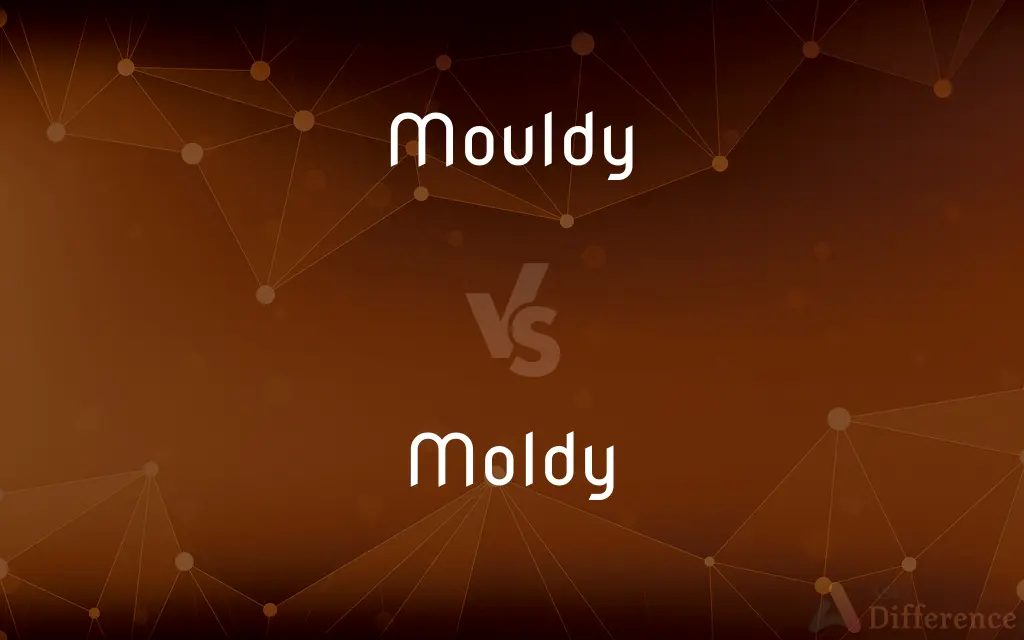Mouldy vs. Moldy — What's the Difference?
Edited by Tayyaba Rehman — By Fiza Rafique — Published on December 24, 2023
"Mouldy" and "Moldy" both refer to the presence of fungal growth. "Mouldy" is the British spelling, while "Moldy" is the American spelling.

Difference Between Mouldy and Moldy
Table of Contents
ADVERTISEMENT
Key Differences
"Mouldy" is a term commonly used in British English to describe something that has been affected or tainted by mould, which is a type of fungus. "Moldy," on the other hand, is the American English version of the same term. Both words essentially signify the presence of fungal growth, often appearing on food, walls, or other surfaces.
In British literature or media, one might come across sentences like, "The bread turned mouldy after being left out for a week." In contrast, in American contexts, the equivalent statement would be, "The bread turned moldy after being left out for a week." The distinction between the two lies purely in regional spelling preferences.
When talking about the conditions or environments conducive to fungal growth, British speakers might refer to a "mouldy" environment, indicating a damp, humid, or stale space. In American parlance, this would be termed a "moldy" environment. The essence and implications of both terms remain unchanged, and they can be used interchangeably if one is mindful of the audience's regional preferences.
In the context of preservation, preventing items from becoming "mouldy" in the UK would involve keeping them dry and free of excess moisture. Similarly, in the US, the objective would be to prevent items from becoming "moldy." Again, the underlying meaning remains the same, but the spelling varies based on regional influences.
Comparison Chart
Spelling Origin
British English
American English
ADVERTISEMENT
Pronunciation
/ˈmoʊldi/
/ˈmoʊldi/
Example Usage
The cheese is mouldy.
The cheese is moldy.
Associated Term
Mould (fungus)
Mold (fungus)
Presence in Dictionaries
In British dictionaries
In American dictionaries
Compare with Definitions
Mouldy
Musty or stale in smell or taste due to fungal growth.
The old books have a distinctly mouldy smell.
Moldy
Having a growth of mold.
The bread is moldy and needs to be thrown away.
Mouldy
Indicative of decay or neglect.
The room had a mouldy feeling from being closed for years.
Moldy
Stale or musty, especially from age or lack of fresh air.
The attic has a moldy smell from years of disuse.
Mouldy
Affected by mould or fungus.
The basement walls are mouldy from the leak.
Moldy
Outdated or old.
That moldy concept won't work in today's world.
Mouldy
Covered with a woolly or fuzzy growth.
The strawberries are mouldy after being forgotten in the fridge.
Moldy
Characterized by the presence of molds or fungus.
Avoid eating moldy fruits as they can be harmful.
Mouldy
Variant of moldy.
Moldy
Covered with or containing mold
Moldy bread.
Mouldy
Covered with mould.
Moldy
Musty or stale, as from age or decay.
Mouldy
Showing signs of neglect; disused.
Moldy
Covered with mold.
Mouldy
Worthless; lousy; rotten.
Moldy
Stale or musty.
Mouldy
Covered with or smelling of mold;
Moldy bread
A moldy (or musty) odor
Moldy
Overgrown with, or containing, mold; smelling of mold; as, moldy cheese or bread.
Mouldy
Old-fashioned or outdated.
His ideas are mouldy and need updating.
Moldy
Covered with or smelling of mold;
Moldy bread
A moldy (or musty) odor
Moldy
Relating to or caused by molds.
She had a moldy allergy and had to keep her home very dry.
Common Curiosities
Which is the correct spelling: "mouldy" or "moldy"?
Both are correct. "Mouldy" is British English and "moldy" is American English.
Are "mouldy" and "musty" the same?
No. While both indicate age or decay, "mouldy" specifically refers to fungal growth, while "musty" refers to a stale smell.
Can I use "mouldy" and "moldy" interchangeably?
While they mean the same thing, it's best to use "mouldy" for British audiences and "moldy" for American audiences.
What does "mouldy" mean?
"Mouldy" means affected by or covered with mould, which is a type of fungus.
Is "mouldy" used in American English?
No, "mouldy" is the British English spelling. Americans use "moldy."
How can I prevent my bread from becoming moldy?
Store it in a cool, dry place and consume it before its expiry date.
Does "mouldy" only refer to food?
No, "mouldy" can refer to anything affected by mould, such as walls, fabric, or air.
If something is "mouldy" or "moldy," does it always mean it's unsafe?
While mould can be harmful, some moulds are used in food production. Always assess the context and type of mould.
Can I eat mouldy cheese?
Some cheeses naturally have mould, like blue cheese. But if mould appears on cheese not meant to have it, it's best to discard it.
How can I prevent my bathroom from getting mouldy/moldy?
Ensure proper ventilation, keep surfaces dry, and regularly clean the bathroom.
What's the plural form of "moldy"?
The plural form is "moldy" items or things, but "molds" for the fungus.
Are "mouldy" and "moldy" pronounced the same?
Yes, both are pronounced as /ˈmoʊldi/.
Which dictionaries include the term "mouldy"?
British dictionaries predominantly feature "mouldy", while American dictionaries list "moldy."
Is it "moldy" or "mouldy" cheese in the U.S.?
In the U.S., it's "moldy" cheese.
Why do British and Americans spell "mouldy" and "moldy" differently?
Spelling differences evolved due to historical, linguistic, and cultural factors.
Share Your Discovery

Previous Comparison
Run Down vs. Run Over
Next Comparison
Product Line vs. Product MixAuthor Spotlight
Written by
Fiza RafiqueFiza Rafique is a skilled content writer at AskDifference.com, where she meticulously refines and enhances written pieces. Drawing from her vast editorial expertise, Fiza ensures clarity, accuracy, and precision in every article. Passionate about language, she continually seeks to elevate the quality of content for readers worldwide.
Edited by
Tayyaba RehmanTayyaba Rehman is a distinguished writer, currently serving as a primary contributor to askdifference.com. As a researcher in semantics and etymology, Tayyaba's passion for the complexity of languages and their distinctions has found a perfect home on the platform. Tayyaba delves into the intricacies of language, distinguishing between commonly confused words and phrases, thereby providing clarity for readers worldwide.












































